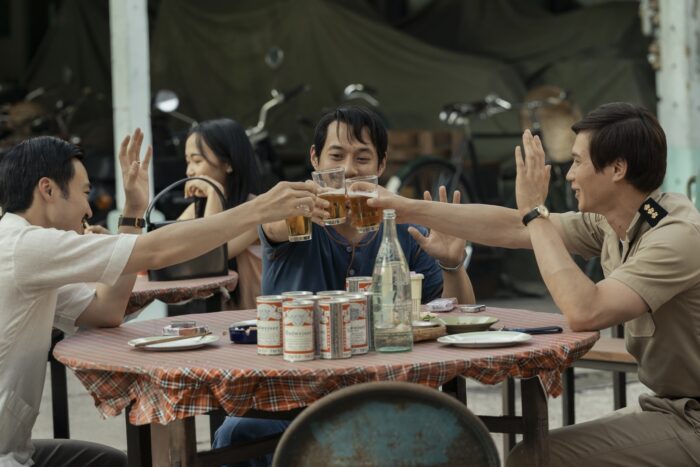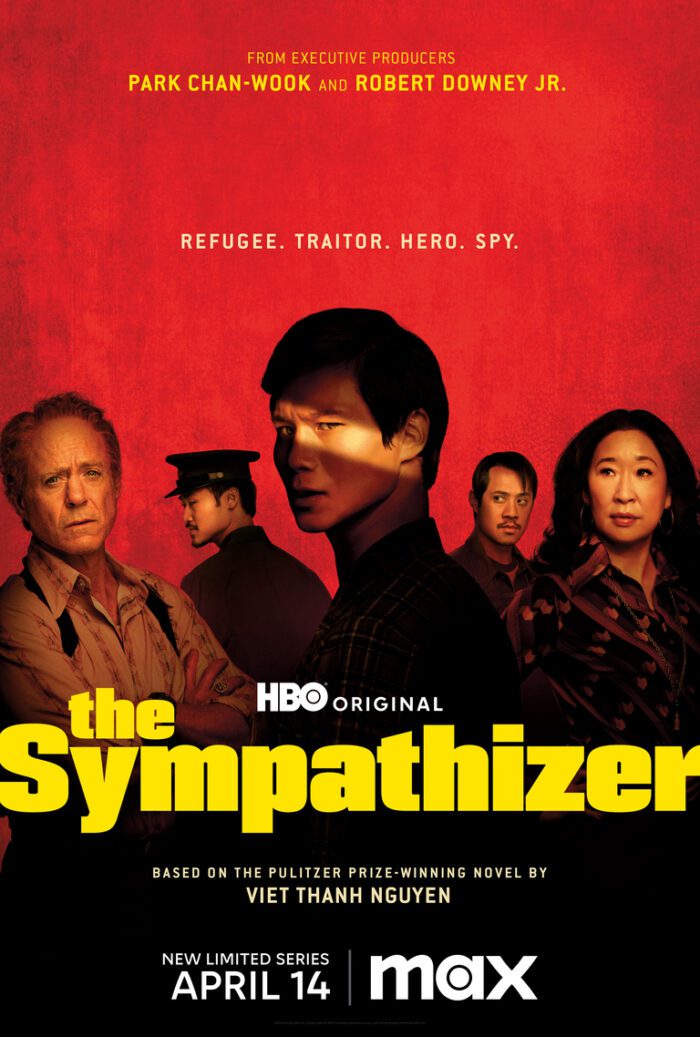The following review contains spoilers for The Sympathizer Episode 1, “Death Wish” (written by Park Chan-wook & Don McKellar and directed by Park Chan-wook)
“All wars are fought twice. The first time on the battlefield. The second time in memory.”
The Sympathizer is a seven-part miniseries that follows the 2015 Pulitzer Prize-winning novel by Vietnamese-American author Viet Thanh Nguyen, which charts the life of a double-agent working for the North Vietnamese government undercover in the South Vietnamese Secret Police from the fall of Saigon to later exile in Southern California, as he follows his erstwhile General into a civilian life that divides his loyalties, interests and sense of self further.
I found the novel entirely engrossing; although we see all events through the unnamed narrator’s life (listed as “The Captain” in the TV series’ captions), he proves less an unreliable narrator than a painfully self-aware one, whose many dualities of birth, culture, language and allegiance are ever warring in his psyche and play out in one darkly-comic scenario after another. For my money, The Sympathizer takes its place among a select few black comedies on the absurdities of war, evoking at times Heller, Vonnegut and Pynchon, with a detailed appreciation of the culture and time that adds a frisson of verisimilitude to Nguyen’s tale.
The series, helmed by Park Chan-wook and Don McKellar, and executive-produced by the Downeys appears to do the novel justice, as does the lead performance by the magnetic Hoa Xuande, who must continually broadcast his inner anguish to the viewer while masking it from friends and associates. In the delicate task of adapting a first-person narrative, the series splits the difference: we open on a distressed 1970s-era newsreel, which offers the first exposition, before meeting the communist interrogator of The Sympathizer, in the ostensible present.
Forcing the audience to read before breaking the silence is but one of many clever choices the director (Park Chan-wook) makes to underline the dizzying series of dualities represented by the show, given that no one is what they seem, and the many texts that circulate—lists of secret police, individuals promised one of 92 seats on the black flight out of Saigon, to the Captain’s memoirs—shift constantly. The pilot works overtime to introduce the primary characters from the protagonist’s life in Saigon and introduce the central themes that define his life and memories before leaving that life behind.

The message “Restart-recollect-reeducate-revolution” introduces the Captain confined in a shack, looking backward pointedly at his tormentor as he is forced to rewrite his past, a past that may have already been written countless times. The episode is named for “Death Wish,” the Charles Bronson movie that marks the time and place when the Captain is instructed to “start at the cinema.” We meet Claude, a profusely freckled Robert Downey, Jr. with strawberry-blond-hair chomping a cigar, the first of many tropes (the oily and unreliable CIA handler) that anchor the narrative in familiar territory. The Captain corrects the movie listed on the marquee, the first of many revisions that suggest the unreliability of memory under siege, and foreshadowing the role cinema will play in the story moving forward. Twice Claude asks the Captain if he knows the meaning of death wish, which—like the puns and double entendres that litter the screenplay—continues the theme of duality, and constant unease. Inside the cinema, the Captain and Claude witness the interrogation of a female communist agent, staged like a theatrical performance, and Claude appeals to a future in which the Captain will look back proudly, to trigger a fuller introduction to our protagonist: the Captain can only ever be “half proud,” as he is a French-Vietnamese half-breed, bilingual (with perfect English), and half in sympathy with every viewpoint, a self-introduction that will be solidified when we meet his close friends and witness his traumatic escape from Saigon. Here we meet the General (Toan Le) as well, a fascinating figure in the book fully realized here along with his family, soon to leave the comfort of their French colonial mansion. The General is split in a different way: he seems to know, despite his admonitions, that Saigon will fall, and the Americans will abandon South Vietnam. The scene in the cinema signals a cinematic memory, whose pain is signaled throughout the episode by flashbacks that actually reverse time as a series of jerky snapshots. We learn that the woman tortured on stage was working with the Captain and is mad with fury that he has appeared to side with the Secret Police. Xuande portrays the full anguish of the protagonist’s complicity, which contrasts with the comfort he feels alongside his oldest friends Bon (Fred Nguyen Khan) and Man (Duy Nguyễn): Bon the naïve loyalist with a wife and child, and Man undercover with the Captain and suspicious of his love-hate relationship with American culture (“you dream in English”).

The first episode of The Sympathizer is overstuffed with themes, narrative devices and symbols, as stage-setting for the story to follow. Although the Captain has no name, he is someone we already know is smarter than his cohort, loyal to his “blood brothers,” and ruthless in pursuing his goals. Yet, we also sense that those goals will become ever hazier and ill-defined on the shores of America. The Captain’s touchstones are as fleeting as his memories: contemporary pop music serves as a thread throughout the pilot, especially American pop, which provides ironic counterpoint alongside the narrative’s twists and turns. Foreshadowed throughout the episode, we expect the flight from Saigon to close the episode, but perhaps not its harrowing reality, as the emigres flee bombs, a burning bus and gunfire to reach their plane, and Bon loses his wife and child in the tumult. We end back with the Captain back in confinement, in sympathy with the sound of Del Shannon’s “Runaway” drifting in from the streets outside.
I will return with a summation of the series when it comes to an end, but I am impressed so far with the creator’s fidelity to the novel while bringing its themes to the fore (perhaps a bit too forcefully) through direction, set design (e.g., Portnoy’s Complaint sits in the General’s study), and sound design. California, here we come!

